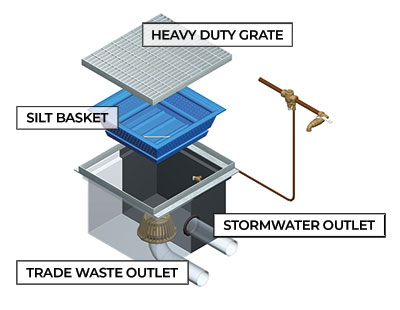Like many businesses that incorporate the use of vehicles as part of day to day operations, golf courses require regular vehicle washdown activities on site.
Because of this, golf courses must comply with environmental best practices to reduce the risk of contaminants entering our natural waterways.
When you consider the potential washdown requirements for many golf courses, the machinery must be taken into consideration. In addition to the obvious, the golf carts, heavy equipment is also used to maintain the golf courses. Fairway and riding greens mowers, commercial mowers and aeration equipment are utilized. It’s therefore, no surprise that many golf courses require an environmentally compliant washdown solution.
Washdown activities are necessary. However, without the proper equipment in place, they run the risk of contaminants entering our waterways. Consequently, causing pollution, degrading water quality and inviting the increased scrutiny of environmental groups and possibly resulting in fines.
In the following article, we’ll address the options golf courses have for managing the wastewater washdown activities.
How wastewater from vehicle washdown causes pollution
Anytime a washdown activity takes place in an area that is not a closed washdown system there is potential for contaminants, such as hydrocarbons, fertilizers and chemicals, silt, and general rubbish to enter our waterways and contribute to waterway pollution.
This is especially the case with golf courses, as golf greens and fairways typically require a high level of maintenance that incorporates the use of machinery, vehicles such as golf carts and chemicals and fertilizers.
Chemicals and fertilizers in particular can be especially problematic with regard to water pollution as they have the capacity to upset the ecological balance of waterways, causing algal blooms which take up much of the dissolved oxygen aquatic flora and fauna rely on.
Pesticides, in addition can also be lethal to many aquatic species of animal and plant life and also contribute to upsetting the natural ecological balance of waterways.
Contaminants such as these are often present during washdown activities. They are picked up by tires or there may be residue on the vehicles surface during washdown which is then carried along with washdown wastewater into stormwater drains where it eventually enters our natural waterways.
Golf courses typically have four options available to them to reduce the potential for water pollution. These include:
- Establishing a closed system washdown area
- Discharging wastewater directly to the sewer
- Discharging water directly to the ground
- Limiting washdown activity to a specified number per week. (typically less than 30 vehicles per week).
Limiting Washdown Activity
While, only smaller golf courses will be able to limit washdown activity, it’s important to note that even if you do wash less than 30 vehicles on a weekly basis, best practices must still be followed with regard to groundwater or your business will require a groundwater discharge permit.
What is groundwater?
Groundwater is any water that permeates the surface and is held underground in the pores of the soil or in rock formations.
This includes:
- Registering your discharge and floor drain with local authorities
- Not engaging in steam cleaning, or any form of power washing, engine cleaning, or undercarriage cleaning that may result in hydrocarbons being absorbed by the ground or surface water.
- Not using detergents that include regulated contaminants (check with your local EPA)
- Preventing surface water discharge (the wastewater is not discharged directly onto surface water)
- The wastewater receives pre-treatment e.g. utilizes an oil-water separator
- Is registered with The Department of Environment and Science (DES)
Obtaining a Groundwater Discharge Permit
If any of the conditions listed above are not met, the golf course should acquire a groundwater discharge permit in accordance with local regulations.
Any wastewater must be treated in accordance with ambient groundwater quality standards.
Discharging wastewater directly to the sewer
Even if the washdown area drainage system leads directly to the sewer network , the washdown system must be registered with the Department of Environment and Science and a number of restrictions may still apply according to local regulations.
These may include restrictions on connections to floor drains or a requirement for pretreatment.
Establishing a closed system washdown area
Closed systems generally do not require permits as the wastewater discharge is contained on site. In many cases, closed water systems utilize holding tanks that hold contaminated waste water that is later collected and disposed of.
Holding tanks do require registration and the contaminants collected must be discharged to an approved facility such as a registered wastewater disposal facility.
 Additional Steps Golf Courses can take to Prevent Contaminants
Additional Steps Golf Courses can take to Prevent Contaminants
While the steps above must be followed in accordance with local wastewater regulations, there are a number of additional steps golf courses can take to prevent contaminants entering local waterways. These include:
- Using a Fox first flush system to prevent the initial first flush (usually caused by rain) from picking up surface contaminants such as hydrocarbons from entering the stormwater network.
- Install pre-treatment screening products such as Fox silt traps and baffled gross pollutant collection units
- Utilising demand driven wastewater diversion systems such as the Fox DD400 and DD600
- Use a roofed washdown area to prevent rainwater runoff of hydrocarbons and other contaminants
- Install a Fox constant monitoring system to ensure the run-off from your washdown site is monitored for contaminants.
Summary
Golf courses like many other businesses must remain environmentally compliant with regard to washdown activity. As noted above, there are an increasing number of products and dedicated systems that can assist and help prevent waterway pollution and fines.
If in doubt about your requirements and available solutions, call the environmental experts at Environmental Equipment Engineering for a no-obligation free consultation.





















